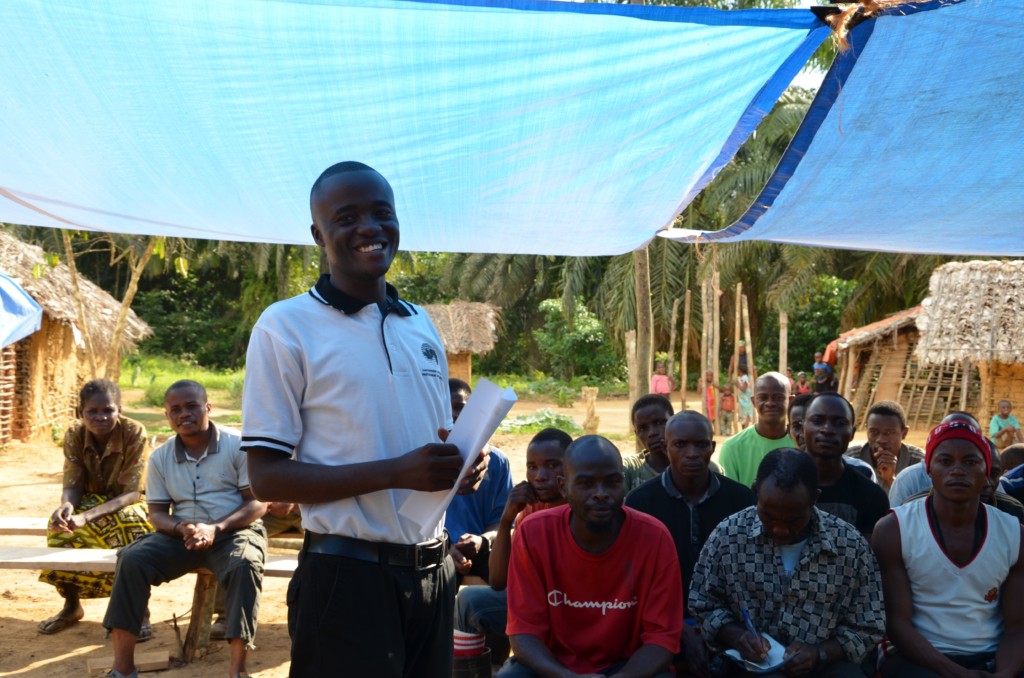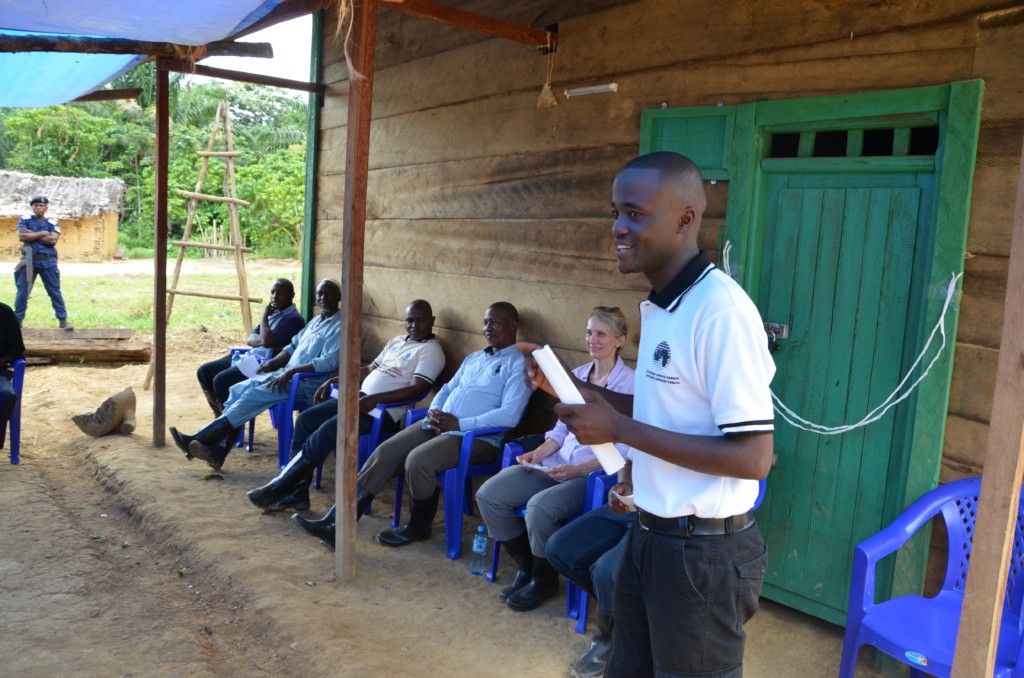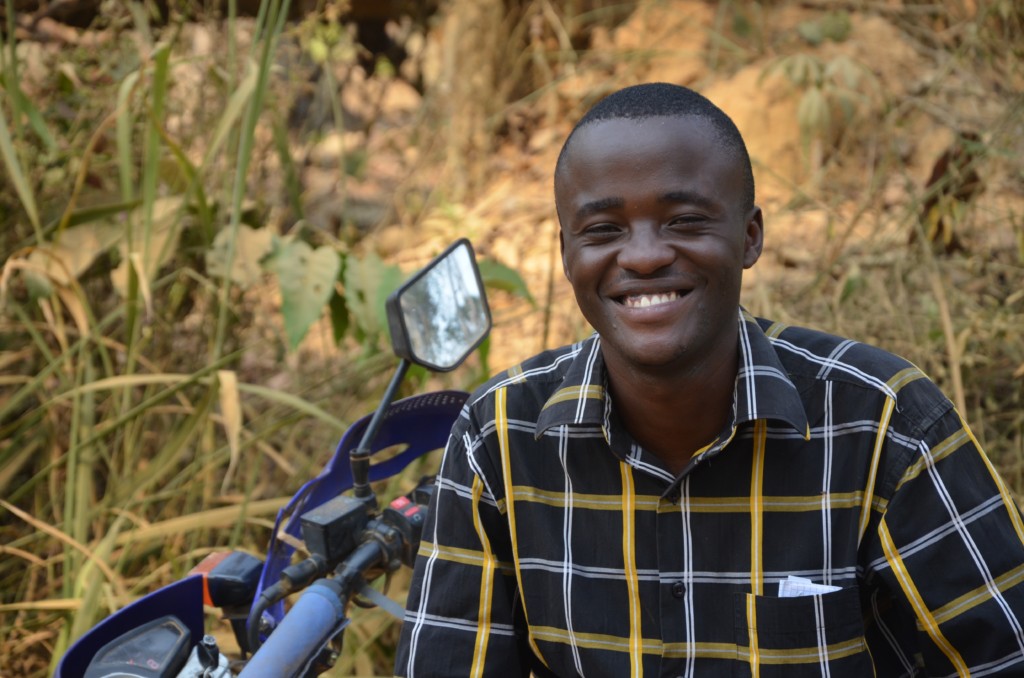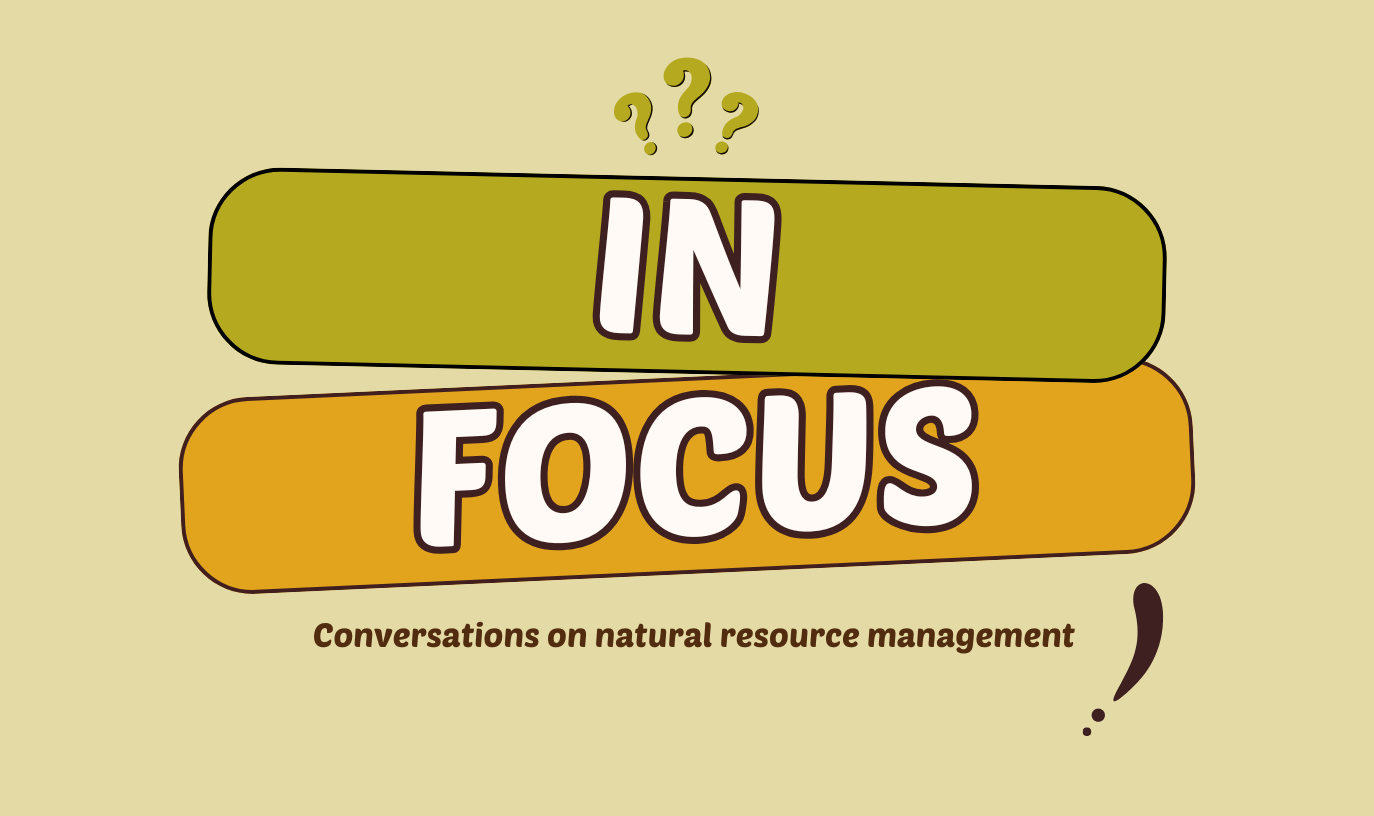Welcome to our In Focus series, where we dive into the key issues shaping responsible mineral supply chains. Through conversations with experts, we unpack the challenges, innovations, and real-world solutions emerging from our work with governments, the private sector, and artisanal miners to support their communities.
This series features stories and insights from IMPACT’s team and partners, touching on our five focus areas: regulatory and legal reform, supply chain transparency, illicit trade, gender equality, and environmental stewardship. Together, we explore how policies can align, stakeholders can collaborate, and equitable practices can take root in the artisanal mining sector.
In this issue, we hear from Oscar Katho, IMPACT’s Environment Officer in Democratic Republic of Congo (DRC). Oscar discusses how artisanal miners can be supported to restore and protect their ecosystems, fostering a shift towards environmental stewardship. As the green technology revolution drives increased demand for mineral extraction and climate change intensifies extreme weather events, artisanal miners are often caught in the middle, facing complex challenges that deeply impact local communities.
Oscar is based in northeastern Ituri Province, and was initially the organization’s Traceability Officer, supporting local supply chain actors to implement traceability and due diligence in IMPACT’s flagship Just Gold project. Drawing on his deep experience in the artisanal gold sector, he is dedicated to supporting mining communities to develop more responsible mining practices that can reduce environmental harm, strengthen community resilience, and preserve ecosystems for generations to come.
There is a growing understanding that we need to safeguard ecosystems and protect biodiversity in mining communities beyond responsible mining closure. Given the need to protect ecosystems and biodiversity in the face of deforestation caused by the growing demand for critical minerals, as well as the impacts of climate change, why is it essential to integrate environmental management into our collaboration with artisanal mining communities?
Oscar: While we may not often link artisanal mining with environmental protection—and instead the opposite first comes to mind—these communities are extremely affected by changes to their ecosystems and biodiversity loss. Artisanal mining is often done close to residential areas where populations depend on their surroundings for farming, fishing, and gathering food, giving them a personal stake in protecting their environment. Activities like deforestation or water contamination don’t just harm nature—they threaten people’s health, safety, and livelihoods.

Environmental protection is also intricately linked to worker safety. The use of inappropriate extraction techniques, such as unregulated digging or working in pits and tunnels without proper protective measures, can destabilize the ground and weaken geological structures. This creates conditions where even small disturbances, such as heavy rainfall or vibrations, can lead to deadly collapses.
In Democratic Republic of Congo (DRC), we’ve had many examples of heavy rains leading to landslides and causing tunnel collapses, resulting in fatalities. In areas where vegetation has been cleared, the soil becomes more prone to erosion, further increasing the risk of landslides.
It’s necessary to ensure that artisanal miners not only have the capacity to protect and restore their environment but also lead these efforts within their communities.
For example, in DRC, we supported artisanal miners to develop a Mitigation and Rehabilitation Plan for their mine sites and mining activities. This supported them to implement more environmentally friendly practices such as planting fast-growing trees to mitigate the risks of erosion and landslides around pits, as well as setting up appropriate areas for washing ore so as not to contaminate aquatic ecosystems.
One of IMPACT’s five focus areas is environmental stewardship. How can this be implemented in the artisanal mining sector and what role do miners play?
Oscar: Environmental stewardship is a general term that refers to how we interact with the environment to ensure its protection, conservation, and sustainability.
Environmental stewardship is about empowering local communities to acknowledge and understand the impacts of their mining activities, while building their capacity to reduce these environmental impacts. This can be through direct technical assistance such as introducing mercury-free gold technology and implementing nature-based adaption measures, such as the reintroduction of native vegetation to promote carbon storage, or even supporting more inclusive governance that integrates ecosystem management.
Artisanal miners often have in-depth knowledge of their local ecosystem. They understand natural cycles like rainfall patterns affecting the agricultural calendar, soil health, and harvest seasons. This knowledge can help them adopt more sustainable practices that work in harmony with their environment.
For example, the miners we work with in DRC understand how a healthy environment helps improve soil health for farming and support other ecosystem services to increase their resiliency to the challenges of climate change. But they don’t always see how their mining work ties into protecting that same environment. Environmental stewardship needs to become top of mind for artisanal miners and their communities, so that they are actively integrating more responsible practices into their activities from the very start.
At its heart, environmental stewardship builds a sense of shared responsibility among artisanal miners, communities, and stakeholders to protect the environment. It means training miners in sustainable techniques, enforcing regulatory frameworks, and supporting initiatives like reforestation and biodiversity restoration. It also aligns mining activities with broader climate goals, such as reducing carbon footprints and strengthening ecosystems to promote resilience to climate change. The goal is a balance where mining supports livelihoods without compromising the health of the environment or the people who depend on it.
In the Just Gold project, we supported artisanal gold miners to become more environmentally responsible through technical assistance. For example, by working with the local mining cooperative, capacity building, and the establishment of a mine site rehabilitation plan, more than 20 mine pits were back-filled and over 7,700 trees were planted in newly established nurseries.
Importantly, we saw miners’ awareness significantly increase on the environmental impacts of artisanal mining. This awareness is the first step in supporting local communities to take action.
In your experience, what are some of the largest challenges to working with local communities to protect the environment in the artisanal mining sector. How can these challenges be overcome?
Oscar: One of the largest challenges to uptake among local communities is the focus on immediate benefits, with little consideration for long-term repercussions. Many miners prioritize daily income over sustainability, often due to pressing economic needs, but also a lack of awareness.

Miners and their communities are often eager to embrace environmentally friendly practices when they see the tangible benefits—safer working conditions, improved health, and more sustainable ways of using ecosystem services for their daily needs. Protecting vital resources like water and land directly impacts their daily lives, making them more likely to get involved in environmental projects.
These efforts also bring people together. Working on initiatives like reforestation or managing shared resources fosters a sense of collaboration and strengthens community bonds where everyone benefits.
However, there are challenges in introducing sustainable environmental management practices, as some communities focus on immediate benefits without considering the long-term consequences. For example, in eastern DRC, some communities have sold large areas to mining cooperatives backed by foreign investors, leading to the devastation of forests and changes to river flows without prior environmental and social impact assessments or plans for mitigating and rehabilitating the mining sites. Once these cooperatives have extracted the minerals, they leave the environment destroyed.
Additionally, the absence of clear regulations and support systems for adopting environmentally friendly practices can further hinder progress. Overcoming these challenges requires working closely with authorities to establish laws that promote sustainable mining while protecting miners’ rights.
Equally important is effective sensitization, linking environmental stewardship to tangible benefits like improved health, safety, and livelihoods. By demonstrating how sustainable practices can lead to safer working conditions, cleaner water, and more stable incomes, communities are more likely to embrace change. Tailored awareness campaigns, peer-to-peer learning, and integrating environmental goals into community development plans can create a mindset shift, fostering a commitment to protecting both the environment and their future.
IMPACT’s Powering Resilience project looks at strategies to integrate community-level interests in ecosystem protection into policies and strategies across different governance levels. What roles do the government and state services play in supporting artisanal miners in moving towards more responsible environmental practices?
Oscar: The government and state services play a key role in developing and implementing clear policies and regulations that promote sustainability. However, these legal and regulatory frameworks must consider Indigenous peoples and local communities, who are the custodians of forests and environmental protection. Their traditional knowledge must be integrated when developing environmental policies and regulations.
The Powering Resilience project will establish more inclusive, egalitarian, and transparent governance mechanisms and processes. It aims to increase the participation of women, youth, and Indigenous peoples in DRC’s decision-making related to ecosystem management, as the resilience of populations in the context of climate change depends largely on the governance of local ecosystems.
Through this project, IMPACT will support the creation of community mechanisms (consultative and decision-making structures) where they do not exist or strengthen those that do exist, for example through Local Development Committees. This will support the representation of Pygmy peoples and women within local, provincial and national institutions.
IMPACT will work with artisanal mining communities across the Democratic Republic of Congo to increase their capacity to restore and safeguard their ecosystems. How does this project contribute to the global fight against climate change?
Oscar: IMPACT’s work with artisanal mining communities in DRC can meaningfully contribute to tackling climate change by addressing both the causes and impacts of environmental degradation. In the Powering Resilience project, we’re working across four provinces in DRC to restore degraded ecosystems, both tropical rainforests and dry forests, known as savannahs.
The project adopts an Ecosystem-based adaptation (EbA) approach and provides local artisanal miners and their communities with the technical assistance needed to restore and protect their environments. This is part of a comprehensive, global strategy to tackle climate change.
As part of the Powering Resilience project, we’ve carried out a rapid assessment of ecosystem services during the baseline. This assessment enabled communities to become more aware of the interconnectivity of the ecosystem services which they depend on. They also understood how unsustainable mining, leads to deforestation and negatively impacts provisioning services offered by the ecosystem.
For example, in the village of Ngagwe, in Mambasa territory, all provisioning ecosystem services, including Non-Timber Forest Products of plant origin, have disappeared due to deforestation. Ten years ago, the local economy of this community was based on these Non-Timber Forest Products such as kola nuts and coconuts, but today it has become difficult to obtain them. To find them, community members must travel several kilometres into the forest, which is difficult, especially for the women who depend on this income.
In addition, protecting local ecosystems enhances biodiversity, which is critical for building the resilience of ecological systems to climate variations. Training communities to integrate environmental concerns into resource management strengthens local governance and ensures long-term adaptation strategies to the impacts of climate change. Raising awareness within mining communities fosters behavioural change, encouraging sustainable practices that could inspire similar efforts in other regions.
Finally, by creating synergies between communities, NGOs, and governments, the project supports collaboration on climate initiatives, aligning local actions with national and global strategies to tackle climate change.
In DRC, we are at a critical juncture. The country is known for its minerals—but its also the largest carbon sink in the world. Our forests play an important role in helping to absorb carbon dioxide from the atmosphere and slow global warming. But these forests are dwindling as mining continues to increase. We need to find a way to ensure harmony between the two—so that mining doesn’t come at the expense of our environment.

Meet Oscar Katho
Oscar is an Environmental Officer with IMPACT, based in Ituri Province. He previously supported local supply chain actors to implement traceability and due diligence, as part of IMPACT’s Just Gold project.
Oscar joined IMPACT in 2015 and brought with him knowledge and experience in setting up responsible gold supply chains. He previously worked in gold sales for a licensed trader in Ituri. Oscar holds a Master’s degree in Environment, with a specialization in Natural Resources Management from Shalom University of Bunia (USB), as well as a Diploma in Information Systems Management from Kampala, Uganda.

